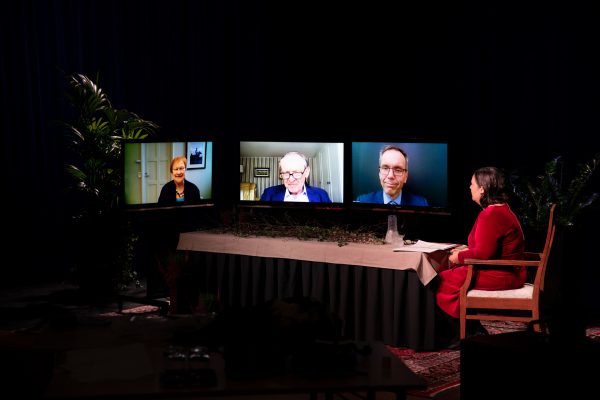Managing the word – The importance of keeping a good tone.
This year’s panelists Jan Eliasson, Swedish ambassador, former Deputy Secretary-General of the United Nations and current Chairman of the Board of SIPRI and Björn Vikström, Professor of Theology at Åbo Akademi University, former bishop and Chairman of the Board of the Anders Chydenius Foundation discussed this year’s theme with the patron of the talks, President Halonen and the Director of the Peace Institute, Sia Spiliopoulou Åkermark.
The panelists discussed about who bears the responsibility for creating peace and how you do it, especially during a pandemic, they all agreed that the pandemic has both made it more difficult and improved the possibilities for contact. Technology has helped with reaching out to bigger crowds but on the other hand it is also worrying to see how authoritarian regimes are exploiting the pandemic situation to further limit the opposition’s ability to e.g., demonstrate.
Eliasson brought up that we, especially in contact with those who think differently from ourselves, have to learn to manage how we communicate. Timing, cultural acceptance and personal relationships are all very important factors that affect our communication. It is important to be able to manage how we communicate since armed conflicts have changed in character in recent decades and are often internal and involve a lot of actors. We should stand by our own values, such as human rights, but at the same time be open in the conversation with others who think in a completely different way. It is brought up that minorities in particular, have a need to feel heard and respected. From his own professional perspective, Björn Vikström emphasizes that the role of religion in conflicts today is often about highlighting cultural identity, what belongs in the “inner” and the “outer”. From this perspective, the importance of religion becomes to be open to the unexpected, where we can see that the inner and the outer are constructs – all people have something in common, we belong together. The path to reconciliation and trust begins with humility in the face of the fact that none of us knows the full truth, but that it can only be created together.
Eliasson spoke of his experiences in connection to the conflict in Sudan. He was once committed to establish a local ceasefire where more than 50 000 people’s lives were at stake. The rebels did not agree to the idea of a ceasefire, so Eliasson’s team realized that they had to come up with a different word since the term “ceasefire” did not work. The term ‘’humanitarian corridor’’ was born, which both sides approved. This is a practical example of how a word actually saved lives and why communication is so important.
Afterwards, there were a concluding conversation where the commentators Johan Pawli, Chief of Police on Åland and former member of the UN peacekeeping forces; Isak Svensson, Professor at the Department of Peace and Conflict Research; Kjell–Åke Nordquist, Professor in International Relations; Susann Simolin, doctoral candidate in Political Science at Åbo Akademi University and Sia Spiliopoulou Åkermark, associate professor in international law commented on the panel’s discussions. The discussion was moderated by the Peace Institute’s information officer, Liz Lindvall.
This year, the commentators took hold of the panel’s message of dialogue. Johan Pawli pointed out that conflict resolution, in addition to being a part of the daily job of the Police, is also a large part of the peacekeeping missions. Here lies the responsibility in finding the isolated people because if they are not found, we will not have an inclusive conversation either. Another point was made by Kjell-Åke Nordquist who stressed that it must be possible to understand what the other part is saying without being perceived as accepting what is being said. When the debate becomes polarised, it is easy to confuse the two.
The commentators also discussed what is meant by the phrase “democracy is under threat’’. When the fall of democracy is mentioned, we often think about politicians who use the situation to seize extreme power, but there is also a counter-movement led by civil society. Popular mobilisation takes place in parallel with the dismantling of democratic institutions, as can be seen in Myanmar, in the Black Lives Matter, Me too and Fridays for Future movements. It is often young people who are at the forefront of this development. Kjell-Åke Nordquist emphasises the increasingly important role of civil society in those countries where democracy is under threat. Johan Pawli describes the phenomenon as a new infrastructure for democracy in the form of “democracy impulses”– and Sia Spiliopoulou Åkermark adds that it is a new public conversation that we cannot really describe yet.
An important conclusion of this year’s Kastelholm Talks is that it is we ourselves who choose what the world should look like after the pandemic. In the large and small society, we can contribute to peace by managing the word and by keeping a good tone when we ourselves speak, and listen with the aim of understanding our counterpart when they speak. As the director of the Peace Institute likes to say, “Peace is a perishable commodity – something we choose and take responsibility for every day.”



